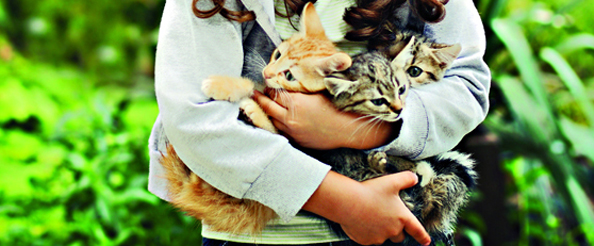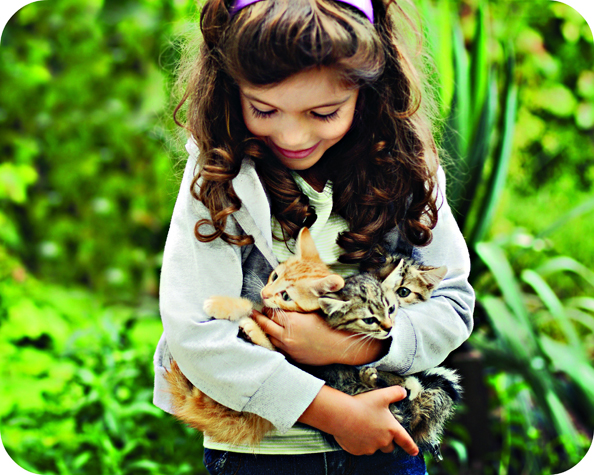Far beyond giving children something to play with, animals provide key emotional and physical development for kids of all ages. If you’re considering a furry addition to your family, read our guide first…
Most of us have a family pet that we recall fondly. Whether it be a cat, a dog, a goldfish, or even a snail that was lovingly plucked from the garden, naming a pet and keeping it under your watchful eye seems to be a childhood rite of passage. Here’s five reasons why you should say yes to a family pet.
1. EMOTIONAL DEVELOPMENT
“Pets are known to reduce stress and anxiety levels,” says Peta Wittig, founder of adopt-me.ae. “Cuddling with your pet can give you a natural chemical boost by releasing serotonin and dopamine.” While this stress relief can help the whole household, research shows that it is children in particular that gain extra support. Peta explains: “Empathy, compassion, nurturing and social skills are all benefits [that children gain] from pet ownership.”
One of the steepest emotional lessons to learn in life is coping with grief. While losing a family pet is can be distressing, Peta suggests that it’s a valuable emotion for children to work through. Recalling her own experiences while growing up on a small farm she says: “I learnt about death and loss, which whilst wasn’t easy at the time, enabled me to manage grief better in later years.”
2. PHYSICAL HEALTH
If a family’s focus is on physical health, then some pets fit in better than others. Horses require a lot of time and energy to take care of, and riding is a fantastic way to keep kids active, while dogs make great running and walking companions for the whole family. “Dogs encourage kids to engage more and spend more time outside, which in today’s world takes a lot,” says Hayley Strifler, behaviourist and trainer from Dubai Senior Dogs Project. “Furthermore, exposure to dogs in youth has also been linked to reduced asthma and increased immunity in later life.”
3. SOCIAL INTERACTION
“Dogs are a great ice breaker and way to meet new people, for kids and adults, particularly where English may be a second language,” says Hayley. Pets are easy to interact with, so children can start to build a connection from a very early age. This one-on-one time with a friendly creature teaches them social skills at a basic level.
Animals can also boost a child’s self-esteem, as they often give lots of affection and show appreciation when their needs are met. “There is nothing better than a cuddle at the end of a tough day from a furry family member who won’t judge and will listen to your problems for hours,” says Peta.
4. COGNITIVE LEARNING
Pets learn responsibility from an early age. “Setting daily tasks like feeding, cleaning, playing and walking all provide a child with structure and life lessons of ownership and responsibility.”
As children get older, pets also encourage children to learn more about animal families and breeds. This can inspire them to read, draw and even learn basic biology if they attend veterinary clinic appointments. Hayley explains that some learning initiatives have taken this one step further. “Studies have shown that programmes like kids reading to dogs improve social and academic confidence.”
5. HEALING QUALITIES
Many studies suggest that animals help sick and disabled children. This can be as simple as lifting their spirits when they’re ill, all the way through to helping those who are physically or mentally disabled.
“From service animals for physical disabilities, to emotional support, there are plenty of programmes out there showing the amazing work pets can do,” says Peta. “Some International hospitals even allow animals to visit certain wards to provide a much needed lift for patients.”
TIPS FROM OUR EXPERTS
• Introduce dogs and babies slowly under the guidance of a professional trainer.
• Consider rescuing an animal as hundreds of pets are put down every year due to lack of space in shelters.
• Go to a reputable shelter as they will give you details of the pet’s personality and decide whether it’s a good fit for your children.
• Remember that young animals such as puppies take a lot of training. Sometimes older animals can integrate into a family quicker.
• Some ‘pedigree’ animals come from breeders looking to make a quick sale and often have health problems.
• Research your new pet, its background and its seller/shelter thoroughly before taking it home.
For more information, visit europets.net, adopt-me.ae or facebook.com/dubaiseniordogs, felinefriendsdubai.com, k9friends.com
If that didn’t convince you maybe these cute vids will:
Image: Getty












